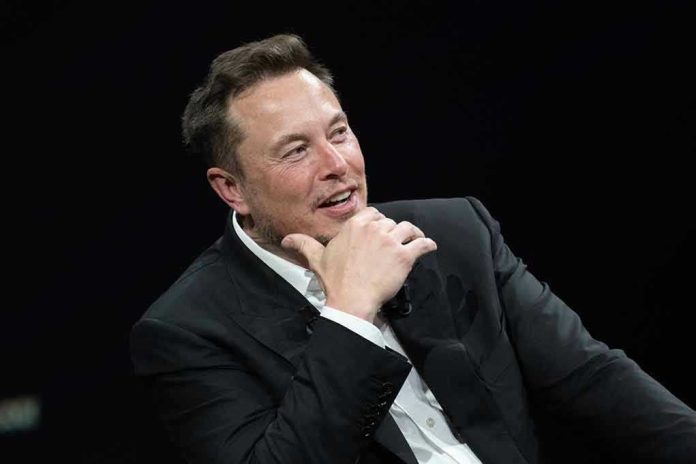
Tesla’s approval of a $1 trillion pay package for Elon Musk has ignited outrage over unchecked corporate power and the dangerous precedent it sets for executive compensation in a time when everyday Americans demand accountability and fairness.
Story Snapshot
- Tesla shareholders approved an unprecedented $1 trillion pay package for CEO Elon Musk, contingent on massive growth targets.
- This deal could make Musk the world’s first trillionaire, raising fierce debates over wealth inequality and corporate governance.
- Major investors both supported and opposed the deal, exposing deep divides over the risks and rewards of singular executive control.
- The package exemplifies growing concerns about concentrated power and the priorities of America’s largest corporations.
Shareholders Greenlight Historic $1 Trillion Payday for Musk
On November 6, 2025, more than 75% of Tesla shareholders approved what is now the largest CEO compensation package in corporate history—potentially worth nearly $1 trillion if Musk can drive Tesla’s market value to an astronomical $8.5 trillion over the next decade. The deal ties Musk’s payout to a series of aggressive performance milestones, a structure reminiscent of his controversial 2018 compensation plan but on an even more staggering scale. The historic package comes at a time when Americans are still reeling from years of leftist economic mismanagement and are demanding that corporate leaders be held to account for their stewardship and values.
This shareholder vote didn’t happen in a vacuum. It arrives as many Americans are still frustrated by the reckless government overspending, surging inflation, and “woke” corporate behavior of recent years. While President Trump’s new administration has brought fiscal sanity back to Washington, the private sector continues to set its own controversial priorities. Tesla’s board justified Musk’s windfall by emphasizing the need for his “unique leadership,” but critics—from consumer advocacy groups to some institutional investors—warn this move dramatically increases Musk’s power and could shift the balance of influence within one of America’s most high-profile companies.
Power Dynamics and the Growing Influence of a Single CEO
Elon Musk’s compensation package, if targets are met, will more than double his current stake in Tesla from 13% to nearly 29%. This consolidation of power raises serious questions about corporate checks and balances at a time when conservatives are already wary of Big Tech and Wall Street giants encroaching on individual liberties and economic freedom. Although shareholders technically retain the right to remove Musk, the size of his potential voting bloc—combined with his vast wealth—means his influence over Tesla’s direction will reach unprecedented heights. While some investors, like Charles Schwab and Morgan Stanley, supported the deal for its alignment of incentives, others, including Norway’s wealth fund and Glass Lewis, opposed it as irresponsible and potentially destabilizing.
Consumer advocacy groups argue that the scale of Musk’s reward is emblematic of a new Gilded Age, where the priorities of the few can overshadow the interests of everyday employees, families, and communities. Their concerns echo those of many Americans who believe that the same elites who pushed globalist and leftist agendas now use their economic clout to sidestep meaningful accountability—and that the consequences could be felt far beyond Wall Street.
Debate Over Corporate Priorities and Political Ramifications
The implications of Musk’s $1 trillion package extend well beyond Tesla. If Musk achieves the required milestones, he will become the world’s first trillionaire, setting a precedent that could reshape executive pay and corporate governance for years to come. This escalation of compensation comes as the broader public continues to question the fairness of such vast income gaps, especially after years of economic pain caused by inflation and policies that seemed to favor the elite over working families. In the short term, the package has sparked renewed scrutiny of executive compensation practices and highlighted the growing divide over what constitutes “responsible” corporate leadership.
Long-term, some experts warn that such extreme wealth concentration could have political and social consequences, especially as Musk’s influence extends into media, technology, and political discourse. With advocates for limited government and constitutional values watching closely, this episode serves as a cautionary tale: unchecked corporate power, if left unchallenged, can threaten the very foundations of American fairness and free enterprise. While supporters argue that bold incentives are necessary for transformative progress, critics contend that this deal sends a troubling message about the priorities of America’s corporate giants.
Musk Wins $1 Trillion Payday
Tesla shareholders approved a plan to grant Elon Musk shares worth nearly $1 trillion if he meets ambitious goals. pic.twitter.com/ULFK76hAuZ
— Nasim Haider (@NasimHaider1557) November 6, 2025
Tesla’s board and shareholders have made their choice, but the debate is far from over. As Musk’s influence grows, so does the responsibility of policymakers, investors, and the American public to ensure that corporate America serves the nation’s interests—not just those of its most powerful executives. This story underscores the need for vigilance, transparency, and an unwavering commitment to the principles that have long defined conservative values: individual liberty, limited government, and equality of opportunity for all.
Sources:
Fortune: Elon Musk’s Trillionaire Path: Tesla Approves Massive Pay Package
The Conversation: Visualising Elon Musk’s Record-Breaking Pay Deal







